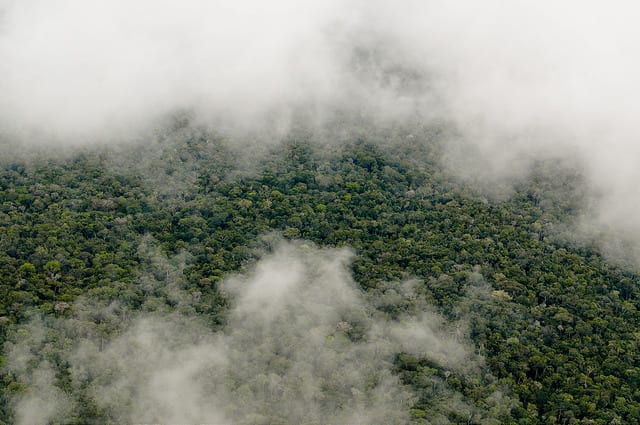 Image courtesy of CIFOR on Flickr
Image courtesy of CIFOR on Flickr
Deforestation Suffocates the Lungs of the Planet
The Amazon Rainforest is the world’s largest rainforest and one of the most biodiverse areas on the planet. It absorbs more carbon than it produces, making it one of the planet’s largest carbon sinks. NBC News reports, “The Amazon takes in as much as 2 billion tons of carbon dioxide a year and releases 20 percent of the planet’s oxygen, earning it the nickname ‘the lungs of the planet.’” About 1.6 billion people worldwide rely on the resources produced by the Amazon, 30 million people live in the region, and nearly 400 indigenous communities directly depend on the ecosystem services the rainforest provides. The services the Amazon delivers to indigenous communities and humans worldwide are irreplaceable. Unfortunately, the rainforest has long been under siege from deforestation.
The Brazilian government recently revealed the Amazon Rainforest has reached its highest levels of deforestation in a decade. Between 2014-2017 deforestation rates skyrocketed. Roughly 7,900 sq km, or about 3,050 sq miles, of the rainforest were cleared annually. The recent rate of deforestation resulted in the removal of over one billion trees primarily through illegal deforestation. The clearing of trees encroaches on indigenous communities and slowly depreciates one of the world’s most invaluable resources.
Deforestation in the Amazon is chiefly due to logging for timber and cattle ranching. Brazil’s timber regulation is weak and often exploited. Nearly 80% of the logging industry in Brazil’s Pará state is illegal. Once cleared, at least 60% of the land is converted to grazing area for cattle. Cattle ranches are known to cause large concentrations of methane emissions, which is another harmful greenhouse gas. Some additional factors that contribute to the Amazon’s deforestation are mining for precious resources and palm oil production. Gold mining and palm oil cultivation both contribute to immediate ecosystem degradation. The illegal mining industry, however, is more dangerous than perceived.
Deforestation of the rainforest and illegal mining operations are directly related, meaning the Amazon’s deforestation possesses serious international security threats beyond climate change. The illegal mining and related mining industry have attracted dangerous and powerful drug cartels and terrorist groups. Latin American drug cartels often use the gold industry as a front for money laundering. Billions of dollars in drug money are converted into clean transactions. Some of unlawfully sourced gold has made its way into the products of major U.S. companies such as Apple and Tiffany & Company. In addition, terrorist organizations, such as al-Qaeda and FARC, use the illegal mineral industry to fund their operations. Stronger rainforest conservation may seem like an obvious answer, but it can be dangerous and difficult. In 2017, Brazil was ranked the most dangerous place in the world for environmental defenders, resulting in the death of dozens of conservationists. Additionally, the sheer size of the rainforest of over 1.4 billion acres is difficult to monitor.
The future of the Amazon is in jeopardy. Brazil’s president-elect Jair Bolsonaro is a known climate skeptic. After Brazil won the bid to host the UN COP25 climate conference in 2019, Brazil withdrew their offer to host the talks. President-elect Bolsonaro has also discussed his plans to leave the Paris Climate Agreement and is anticipated to relax environmental regulations and weaken environmental agencies once he takes office. His election seems to have emboldened deforestation, resulting in a 36% increase after his win.
The protection of the Amazon Rainforest is vital for the world, not just South America. Without the Amazon acting as a carbon sink, climate change would accelerate to extraordinary levels. The complete destruction of the Amazon would cause hundreds of indigenous communities to lose their homes and further promote illicit trade and the related criminal organizations. The deforestation of the Amazon is directly related to international security threats. President-elect Bolsonaro should reinforce environmental regulations and agencies rather than undo them. This would strengthen Brazil’s ability to defend the rainforest from illegal activity through safe and effective means.





